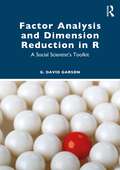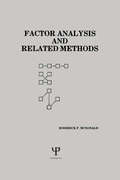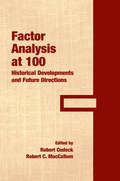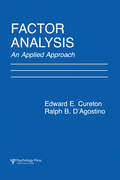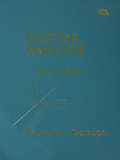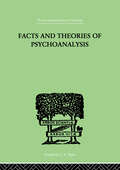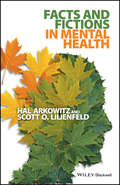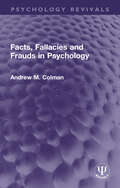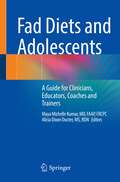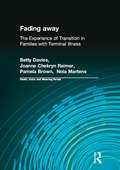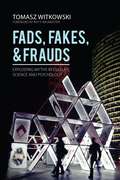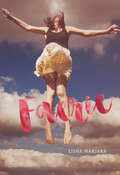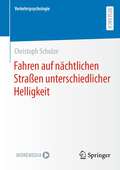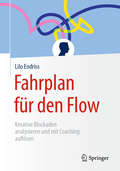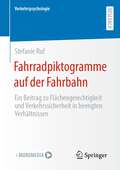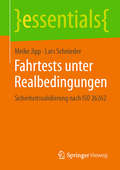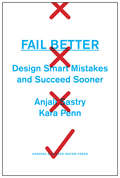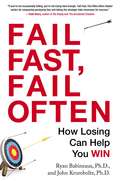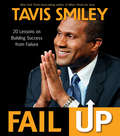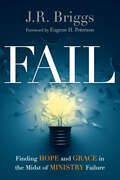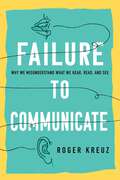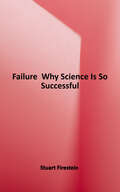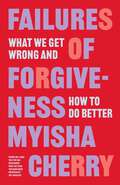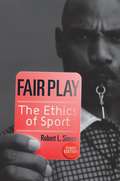- Table View
- List View
Factor Analysis and Dimension Reduction in R: A Social Scientist's Toolkit
by G. David GarsonFactor Analysis and Dimension Reduction in R provides coverage, with worked examples, of a large number of dimension reduction procedures along with model performance metrics to compare them. Factor analysis in the form of principal components analysis (PCA) or principal factor analysis (PFA) is familiar to most social scientists. However, what is less familiar is understanding that factor analysis is a subset of the more general statistical family of dimension reduction methods. The social scientist's toolkit for factor analysis problems can be expanded to include the range of solutions this book presents. In addition to covering FA and PCA with orthogonal and oblique rotation, this book’s coverage includes higher-order factor models, bifactor models, models based on binary and ordinal data, models based on mixed data, generalized low-rank models, cluster analysis with GLRM, models involving supplemental variables or observations, Bayesian factor analysis, regularized factor analysis, testing for unidimensionality, and prediction with factor scores. The second half of the book deals with other procedures for dimension reduction. These include coverage of kernel PCA, factor analysis with multidimensional scaling, locally linear embedding models, Laplacian eigenmaps, diffusion maps, force directed methods, t-distributed stochastic neighbor embedding, independent component analysis (ICA), dimensionality reduction via regression (DRR), non-negative matrix factorization (NNMF), Isomap, Autoencoder, uniform manifold approximation and projection (UMAP) models, neural network models, and longitudinal factor analysis models. In addition, a special chapter covers metrics for comparing model performance. Features of this book include: * Numerous worked examples with replicable R code * Explicit comprehensive coverage of data assumptions * Adaptation of factor methods to binary, ordinal, and categorical data * Residual and outlier analysis * Visualization of factor results * Final chapters that treat integration of factor analysis with neural network and time series methods Presented in color with R code and introduction to R and RStudio, this book will be suitable for graduate-level and optional module courses for social scientists, and on quantitative methods and multivariate statistics courses.
Factor Analysis and Related Methods
by Roderick P. McDonaldFactor Analysis is a genetic term for a somewhat vaguely delimited set of techniques for data processing, mainly applicable to the social and biological sciences. These techniques have been developed for the analysis of mutual relationships among a number of measurements made on a number of measurable entities. In the broad sense, factor analysis comprises a number of statistical models which yield testable hypotheses -- hypotheses that may confirm or disconfirm in terms of the usual statistical procedures for making tests of significance. It also comprises a number of simplifying procedures for the approximate description of data, which do not in any sense constitute disconfirmable hypotheses, except in the loose sense that they supply approximations to the data. In literature, the two types of analysis have often been confused. This book clarifies the concepts of factor analysis for students or professionals in the social sciences who wish to know the technique, rather than the mathematics, of factor theory. Mathematical concepts are described to have an intuitive meaning for the non-mathematical reader. An account of the elements of matrix algebra, in the appendix, and the (mathematical) notes following each chapter will help the reader who wishes to receive a more advanced treatment of the subject. Factor Analysis and Related Methods should prove a useful text for graduate and advanced undergraduate students in economics, the behavioral sciences, and education. Researchers and practitioners in those fields will also find this book a handy reference.
Factor Analysis at 100: Historical Developments and Future Directions
by Robert C. MacCallum Robert CudeckFactor analysis is one of the success stories of statistics in the social sciences. The reason for its wide appeal is that it provides a way to investigate latent variables, the fundamental traits and concepts in the study of individual differences. Because of its importance, a conference was held to mark the centennial of the publication of Charle
Factor Analysis: An Applied Approach
by Ralph B. D'Agostino Edward E. CuretonFirst published in 1993. Routledge is an imprint of Taylor & Francis, an informa company.
Factor Analysis: Classic Edition (Psychology Press And Routledge Classic Editions Ser.)
by Richard L. GorsuchComprehensive and comprehensible, this classic covers the basic and advanced topics essential for using factor analysis as a scientific tool in psychology, education, sociology, and related areas. Emphasizing the usefulness of the techniques, it presents sufficient mathematical background for understanding and sufficient discussion of applications for effective use. This includes not only theory but also the empirical evaluations of the importance of mathematical distinctions for applied scientific analysis.
Facts And Theories Of Psychoanalysis (International Library Of Psychology Ser.)
by Hendrick, IvesFirst Published in 1999. Routledge is an imprint of Taylor & Francis, an informa company.
Facts and Fictions in Mental Health
by Scott O. Lilienfeld Hal ArkowitzWritten in a lively and entertaining style, Facts and Fictions in Mental Health examines common conceptions and misconceptions surrounding mental health and its treatment. Each chapter focuses on a misconception and is followed by a discussion of related findings from scientific research. A compilation of the authors' "Facts and Fictions" columns written for Scientific American Mind, with the addition of six new columns exclusive to this book Written in a lively and often entertaining style, accessible to both the undergraduate and the interested general reader Each chapter covers a different "fiction" and allows readers to gain a more balanced and accurate view of important topics in mental health The six new columns examine myths and misconceptions of considerable interest and relevance to undergraduates in abnormal psychology courses Introductory material and references are included throughout the book
Facts, Fallacies and Frauds in Psychology (Psychology Revivals)
by Andrew M. ColmanAre the effects of hypnosis real or imagined?Is intelligence determined by nature or nurture?Will ordinary people perform acts of cruelty if ordered to do so by authority figures?Are anorexia and bulimia nervosa forms of depression?Why do some groups outscore others on IQ tests?Is there any real evidence of ESP?These are some of the questions that continued to generate fierce arguments among psychologists and excite considerable general interest in the 1980s and beyond. But where does the truth lie? Originally published in 1987, Facts, Fallacies and Frauds in Psychology looks closely at these six popular and controversial issues. In each case the central ideas are explained and research findings presented in such a way that readers can begin their own voyage of scientific discovery, develop a clearer, deeper understanding – and find out how psychologists really think. Reputations are assessed: fraud is unflinchingly exposed.This entertaining and provocative book will still fascinate the general reader and provide an excellent introduction for students of psychology.This book is a re-issue originally published in 1987. The language used is a reflection of its era and no offence is meant by the Publishers to any reader by this re-publication.
Fad Diets and Adolescents: A Guide for Clinicians, Educators, Coaches and Trainers
by Alicia Dixon Docter Maya Michelle KumarFad diets have influenced our society for hundreds of years. While they are heterogeneous in nature, they make many of the same promises: weight loss, fat burning, muscle building, flatter stomachs, improved gut health, clearer skin, and protection of animal rights and the environment. Not only are fad diets usually ineffective, they are often highly restrictive and associated with significant health risks. Furthermore, the practice of fad dieting dramatically increases one’s risk of developing malnutrition and/or an eating disorder. Adolescence is a period of rapid physical and socioemotional growth during which young people become more vulnerable to poor body image and low self-esteem, which may make adolescents particularly likely to adopt fad diets. However, the nutritional risk incurred could result in serious and potentially permanent impairment of physical and psychosocial development. This book provides an overview of fad diets through the ages, highlighting what all fad diets have in common and how to recognize a fad diet. Readers will learn what science tells us about nutritional needs during adolescence for normal physical, cognitive, and socioemotional development, and the risks that may be incurred if a fad diet prevents an adolescent from meeting these needs. This book examines why adolescents may be particularly prone to fad dieting and why they may also have more to lose if they adopt them. Readers will explore factors that shape adolescent diet culture. This book makes specific recommendations for caring adults in the lives of adolescents, including interdisciplinary health care providers, teachers, coaches, trainers, parents and other caregivers, to steer adolescents away from fad diets and towards healthier alternatives for achieving their goals. The initial chapters are didactic chapters that outline core material. Subsequent chapters use illustrative case examples to teach the reader how to screen adolescents for fad dieting, listen to the concerns that attracted them to the diet, engage them in a discussion about their goals, and collaborate with them to find a healthier path. All chapters conclude with discussion questions for further reflection.
Fading away: The Experience of Transition in Families with Terminal Illness (Death, Value And Meaning Ser.)
by Betty Davies PhD.This book comes out of an in-depth, qualitative study of the experiences of twenty-three families in which one parent was dying of cancer. The study attempted to better understand the impact of terminal illness on the entire family system and sought to develop a theoretical framework that would guide the assessment of and services to such families. As a result of interviews with patients, spouses and their adult children over three phases of the study, the process of ""fading away"" was identified and conceptualized in terms of various phases which contributed to this process. The book is not a research report but rather presents more generally the ideas that developed from the study, with two purposes: to increase the reader's understanding of particular experiences that families encounter when dealing with terminal illness, specifically cancer. The intended readership also includes families themselves: to propose guidelines for care to be considered by practitioners working with such families.
Fads, Fakes, and Frauds: Exploding Myths in Culture, Science and Psychology
by Tomasz WitkowskiThis book is a collection of skeptical social essays in which the author reveals that much of our popular beliefs, psychology and science are defective, because, although we live in the 21st century, our approach to them is deeply rooted in our culture, a
Faerie
by Eisha MarjaraJust days before her eighteenth birthday, Lila has resolved to end her life. The horror of becoming an adult, and leaving her childhood behind, has broken her heart.Faerie, a novel for young people, is the fierce yet gently unfolding story of a hyper- imaginative girl who is on a collision course to womanhood. She likens herself to a half-human fairy creature who does not belong in the earthly world; but in the cold light of day she is a psychiatric patient at a hospital, where she is being treated for anorexia - her sickness driven by the irrational need to undo nature and thwart the passage of time.Lila tells the story of how she ended up on the Four East wing: we flash back to her childhood in the eighties, growing up in a small town as the overweight brown kid of Punjabi immigrant parents: her father, a literary scholar whom she idolizes, and her mother, a housewife - "the most female of all females who found comfort in cooking." Faerie weaves these passages with Lila's downward spiral into life-threatening illness, her budding sexuality, and her complicated recovery in hospital that comes with a price. Written with candor and heartbreaking lyricism, Faerie is a plaintive yet ultimately life-affirming love letter to the bold, flawed splendor that is childhood.Eisha Marjara has written and directed several award-winning films, including the critically acclaimed NFB docudrama Desperately Seeking Helen. Her latest, House for Sale, has won numerous film festival awards. Faerie is her first novel. She lives in Montreal, Quebec.
Fahren auf nächtlichen Straßen unterschiedlicher Helligkeit (Verkehrspsychologie)
by Christoph SchulzeDem nächtlichen Straßenverkehr kommt eine hohe Bedeutung zu, wobei die Sichtbedingungen und deren technische Unterstützung durch künstliche Beleuchtung zentral sind. Ein Großteil der wissenschaftlichen Diskussion in diesem Bereich beschäftigt sich mit der Sichtbarkeit von mehr oder weniger definierten Einzelobjekten, oft vor einem anlassbezogenen Hintergrund der Verkehrssicherheit. Die vorliegende Arbeit widmet sich dem weit seltener beforschten, unter Praxisgesichtspunkten jedoch höchst relevanten, regelmäßig stattfindenden nächtlichen Fahrverhalten und untersucht, welchen Einfluss das Helligkeitsniveau (nächtliche Fahrbahnleuchtdichte) darauf hat. Ausgehend von einer heterogenen Theorien- und empirische Befundlage beforschen drei Fahrsimulatorstudien unter lichttechnisch kontrollierten Bedingungen den Zusammenhang bei unbeeinflusster Fahrt (verschiedene Voraussichtweiten und fahrregulatorische Anforderungen) sowie bei Manövern im Fahrprozess, die Teil der permanenten Längs- und Querführung sind (Übergänge Gerade zu Kurve) oder eher singulären Charakter haben (Fahrstreifenwechsel). Im Ergebnis wird ein bedeutsamer Einfluss des nächtlichen Helligkeitsniveaus von Straßen auf das regelmäßige Fahren belegt und ein Beitrag zur Klärung der diesbezüglich heterogenen Literaturlage geleistet.
Fahrplan für den Flow: Kreative Blockaden analysieren und mit Coaching auflösen
by Lilo EndrissErfreuliche Flow- und Glücksgefühle entstehen, wenn sich der Mensch ungebremst seinen Zielen widmen kann. Häufig jedoch kommen Störfaktoren bei der Umsetzung seiner Ideen dazwischen - er fühlt sich blockiert. Das vorliegende Werk arbeitet mittels eines anschaulichen Fahrplans heraus, an welchen Stellen des psychischen Systems genau Blockaden der Kreativität entstehen, wie sie bezeichnet werden und wie sie durch passende Gegenmaßnahmen wie Anregungen zur Selbstreflexion, Übungen und Coaching-Tools entfernt werden können, damit die kreative Energie wieder fließt.
Fahrradpiktogramme auf der Fahrbahn: Ein Beitrag zu Flächengerechtigkeit und Verkehrssicherheit in beengten Verhältnissen (Verkehrspsychologie)
by Stefanie RufFahrradpiktogramme auf der Fahrbahn können genutzt werden, um Radfahrende in beengten Verhältnissen auf ihr Recht, auf der Fahrbahn zu fahren, aufmerksam zu machen. Gleichzeitig dienen sie als Hinweis für Kfz-Fahrende, auf Radfahrende auf der Fahrbahn vorbereitet zu sein und diesen rücksichtsvoll zu begegnen. International sind sicherheitsförderliche Effekte der Maßnahmen gut belegt, eine Untersuchung im deutschen Verkehrskontext stand bisher jedoch noch aus. Stefanie Ruf begleitet die Umsetzung von Piktogrammen in verschiedenen deutschen Kommunen mit Vorher-Nachher-Befragungen im Feld sowie mit einer ergänzenden kontrollierten Online-Befragung. Ihre Erkenntnisse zeigen, dass Fahrradpiktogramme auf der Fahrbahn auch in Deutschland einen Beitrag zu Flächengerechtigkeit und Verkehrssicherheit leisten können, gleichzeitig werden auch wichtige Einschränkungen diskutiert.
Fahrtests unter Realbedingungen: Sicherheitsvalidierung nach ISO 26262 (essentials)
by Lars Schnieder Meike JippFahrerassistenz, Fahrzeugautomation und vernetzte Systeme beschreiben die Zukunft der Automobilität und schüren die Erwartung essentiell verbesserter Verkehrssicherheit. Meike Jipp und Lars Schnieder verknüpfen eine ingenieurmäßige Sichtweise, die durch funktionale Sicherheit (ISO 26262:2018) und sichere Sollfunktion (ISO/PAS 21448:2019) geprägt ist, mit der Perspektive der Ingenieurpsychologie, die mithilfe sozialwissenschaftlicher Methoden menschzentrierte Automobilität sicher zu gestalten versucht. Der Mensch wird je nach Automationsgrad als Rückfallebene mit im Gesamtsystem berücksichtigt und auch zukünftig bei der Gestaltung vernetzter Systeme, die ihr Verhalten aufeinander abstimmen, eine zentrale Rolle spielen.Die Autoren: Prof. Dr. Meike Jipp forscht am Deutschen Zentrum für Luft- und Raumfahrt (DLR) e.V. im Institut für Verkehrssystemtechnik. Dr.-Ing. Lars Schnieder ist als Geschäftsführer einer Software-Entwicklungsfirma für das Geschäftsfeld Sicherheitsbegutachtung verantwortlich.
Fail Better: Design Smart Mistakes and Succeed Sooner
by Anjali Sastry Kara PennIf you’re aiming to innovate, failure along the way is a given. But can you fail better? Whether you’re rolling out a new product from a city-view office or rolling up your sleeves to deliver a social service in the field, learning why and how to embrace failure can help you do better, faster. Smart leaders, entrepreneurs, and change agents design their innovation projects with a key idea in mind: ensure that every failure is maximally useful. In Fail Better, Anjali Sastry and Kara Penn show how to create the conditions, culture, and habits to systematically, ruthlessly, and quickly figure out what works, in three steps: 1. Launch every innovation project with the right groundwork 2. Build and refine ideas and products through iterative action 3. Identify and embed the learning Fail Better teaches you how to design your efforts to test the boundaries of your thinking, explore crucial interdependencies, and find the factors that can shift results from just acceptable to groundbreaking-or even world-changing. Practical instructions intertwined with compelling real-world examples show you how to: Make predictions and map system relationships ahead of time so you can better assess results Establish how much failure you can afford Prioritize project activities for disconfirmation and iteration Learn from every action step by collecting and examining the right data Support efficient, productive habits to link action and reflection Distill, share, and embed the lessons from every success and failure You may be a Fortune 500 manager, scrappy start-up innovator, social impact visionary, or simply leading your own small project. If you aim to break through without breaking the bank-or ruining your reputation-this book is for you.
Fail Fast, Fail Often
by Ryan BabineauxWhat if your biggest mistake is that you never make mistakes? Ryan Babineaux and John Krumboltz, psychologists, career counselors, and creators of the popular Stanford University course "Fail Fast, Fail Often,” have come to a compelling conclusion: happy and successful people tend to spend less time planning and more time acting. They get out into the world, try new things, and make mistakes, and in doing so, they benefit from unexpected experiences and opportunities. Drawing on the authors’ research in human development and innovation, Fail Fast, Fail Often shows readers how to allow their enthusiasm to guide them, to act boldly, and to leverage their strengths-even if they are terrified of failure. .
Fail Up: 20 Lessons On Building Success From Failure
by Tavis Smiley"Failure is an inevitable part of the human journey," says award-winning television and radio broadcaster and New York Times best-selling author Tavis Smiley. Smiley steps from behind the curtain of success to share intimate stories of his missteps, misdeeds, and often highly publicized miscalculations in Fail Up: 20 Lessons On Building Success From Failure. These instances of perceived "failures" were, in fact, "lessons" that shaped the principles and practices that now guide his life. Readers will find a kinship in Smiley’s humanness that inspires, informs, and reminds us of our ability to "fail up" in the face of life’s inevitable setbacks. The year-long celebration of Smiley’s 20th year anniversary in broadcasting will feature the Fail Up book tour.
Fail: Finding Hope and Grace in the Midst of Ministry Failure
by J.R. BriggsBest Books About the Church from Byron Borger, Hearts and Minds Bookstore"I thought God had called me to plant this church. Why did we have to shut our doors after only three years?""I was at my breaking point. Then I got the news that our nine-year-old daughter had leukemia. I would have quit ministry forever, but I had no other employable skills.""False accusations were made against me and my family, wrecking our reputation permanently and forcing us to leave not only the church, but move out of the area.""I've served my church for the past 27 years and I've grown that church from 150 to 24 people."What do we do when we've failed? Some ministries are shipwrecked by moral failures like affairs or embezzlement. But for most of us, the sense of failure is more ordinary: disillusionment, inadequacy, declining budgets, poor decisions, opposition, depression, burnout. Many pastors are deeply broken and wounded, and we come to doubt that God has any use for us.J.R. Briggs, founder of the Epic Fail Pastors Conference, knows what failure feels like. He has listened to pastors who were busted in a prostitution sting or found themselves homeless when ejected from ministry. With candid vulnerability, Briggs explores the landscape of failure, how it devastates us and how it transforms us. Without offering pat answers or quick fixes, he challenges our cultural expectations of success and gives us permission to grieve our losses. Somehow, in the midst of our pain, we are better positioned to receive the grace of healing and restoration.
Failure to Communicate: Why We Misunderstand What We Hear, Read, and See
by Roger Kreuz&“Why didn&’t they understand me? I was as clear as I could be.&” Everyone has had this thought at one time or another. Research from the fields of psychology and cognitive science can provide concrete answers to these questions. In Failing to Communicate, Dr. Roger Kreuz explores the answers to these questionsWe are exposed to the dangers of miscommunication early in life. As children, we play the Telephone Game and learn an important lesson about the fragility of long communication chains. And as adults, we are constantly on the lookout for misunderstanding. People interrupt each other, on average, about every ninety seconds in order to check their understanding. Despite such vigilance, however, a great deal of what is said and written is not understood as intended.Miscommunication has led to military defeats, the loss of spacecraft, and even more tragically, accidents that cost human lives. It plays a role in road rage and social media feuds. It haunts the courtroom, the boardroom, and the singles bar. Failing to Communicate includes dozens of such examples and explains them in light of what researchers have discovered about how communication works—and why it so often fails.Research from psychology and cognitive science has revealed a host of specific factors that contribute to misunderstanding. Some of these have to do with how our minds make sense of what we hear and read, while others are the result of cognitive, social, and cultural factors. The very structure of a given language can be problematic as well. In short, there is no one reason for miscommunication: there are a host of underlying causes.Issues of misunderstanding have only multiplied as new mediums for communication have arisen. Emails, texts, and social media posts are even more problematic because they are impoverished modes of communication. Without facial cues, tone of voice, gestures, and even the creative use of silence, our intentions in these text-only mediums are even more likely to go awry.Failing to Communicate is intended to appeal, from beginning to end, to the general reader who wants to know more about why our attempts at communication fail so often
Failure: Why Science is so Successful
by Stuart FiresteinThe general public has a glorified view of the pursuit of scientific research. However, the idealized perception of science as a rule-based, methodical system for accumulating facts could not be further from the truth. Modern science involves the idiosyncratic, often bumbling search for understanding in uncharted territories, full of wrong turns, false findings, and the occasional remarkable success. In his sequel to Ignorance (Oxford University Press, 2012), Stuart Firestein shows us that the scientific enterprise is riddled with mistakes and errors - and that this is a good thing! Failure: Why Science Is So Successful delves into the origins of scientific research as a process that relies upon trial and error, one which inevitably results in a hefty dose of failure. <p><p>Scientists throughout history have relied on failure to guide their research, viewing mistakes as a necessary part of the process. Citing both historical and contemporary examples, Firestein strips away the distorted view of science as infallible to provide the public with a rare, inside glimpse of the messy realities of the scientific process. An insider's view of how science is carried out, this book will delight anyone with an interest in science, from aspiring scientists to curious general readers. Accessible and entertaining, Failure illuminates the greatest and most productive adventure of human history, with all the missteps along the way.
Failures of Forgiveness: What We Get Wrong and How to Do Better
by Myisha CherryPhilosopher Myisha Cherry teaches us the right ways to deal with wrongdoing in our lives and the worldSages from Cicero to Oprah have told us that forgiveness requires us to let go of negative emotions and that it has a unique power to heal our wounds. In Failures of Forgiveness, Myisha Cherry argues that these beliefs couldn&’t be more wrong—and that the ways we think about and use forgiveness, personally and as a society, can often do more harm than good. She presents a new and healthier understanding of forgiveness—one that will give us a better chance to recover from wrongdoing and move toward &“radical repair.&”Cherry began exploring forgiveness after some relatives of the victims of the mass shooting at Emanuel A.M.E. Church in Charleston, South Carolina, forgave what seemed unforgiveable. She was troubled that many observers appeared to be more inspired by these acts of forgiveness than they were motivated to confront the racial hatred that led to the killings. That is a big mistake, Cherry argues. Forgiveness isn&’t magic. We can forgive and still be angry, there can be good reasons not to forgive, and forgiving a wrong without tackling its roots solves nothing. Examining how forgiveness can go wrong in families, between friends, at work, and in the media, politics, and beyond, Cherry addresses forgiveness and race, canceling versus forgiving, self-forgiveness, and more. She takes the burden of forgiveness off those who have been wronged and offers guidance both to those deciding whether and how to forgive and those seeking forgiveness.By showing us how to do forgiveness better, Failures of Forgiveness promises to transform how we deal with wrongdoing in our lives, opening a new path to true healing and reconciliation.
Fair Play
by Robert L. SimonIn this updated third edition, Simon (philosophy, Hamilton College) provides a philosophical analysis of the ethics of competitive athletics. A critique of moral and ethical relativism is offered in the introductory chapter in order to establish the justifiability of moral judgments made in subsequent sections. Simon defends competition against its critics as being, ideally, a "mutual quest for excellence," as opposed to a mere manifestation of selfishness, and he applies internal and external hypotheses as regards the origin of sports morality to particular issues of sportsmanship and fairness. New to the third edition is an examination of genetic enhancement and sports. Other moral and ethical issues and dilemmas explored include the use of performance-enhancing drugs, gender equity in sports, the commercialization of sports, violence, collegiate athletics, and the role of sports in moral education. Annotation ©2011 Book News, Inc. , Portland, OR (booknews. com)
Fair Play
by Robert L. SimonAddressing both collegiate and professional sports, the updated edition of Fair Play explores the ethical presuppositions of competitive athletics and their connection both to ethical theory and to concrete moral dilemmas that arise in actual athletic competition. A major new section in chapter four examines the ethics of genetically enhancing athletic abilities. Other new material covers the analysis of sports and games according to influential philosopher Bernard Suits; the morality of cheating and the ethics of strategic fouling; and the impact of performance-enhancing drugs on the legitimacy of records. In addition, Simon provides enhanced considerations of the morality of competition in sports, the ethical aspects of violence in sports, and the arguments in defense of intercollegiate sports.
